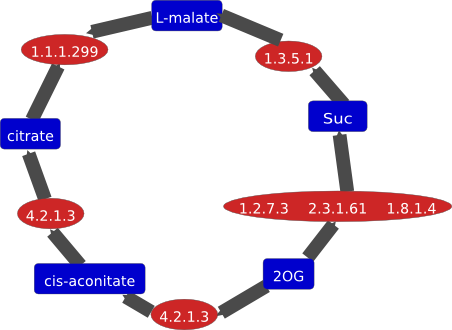EC Number   |
Protein Variants   |
Reference   |
|---|
    2.1.1.5 2.1.1.5 | A119G |
1.9fold reduced turnover-number for betaine and L-homocysteine, 1.6fold reduced KM-value for L-homocysteine, 1.1fold decrease in Km-value for betaine |
657817 |
    2.1.1.5 2.1.1.5 | A66V |
nonsynonymous SNP identified using 240 DNA samples from four ethnic groups |
689024 |
    2.1.1.5 2.1.1.5 | Arg16Cys |
nonsynonymous SNP identified using 240 DNA samples from four ethnic groups, Km (mM): 0.0139 (betaine), 0.0076 (L-homocysteine) |
689024 |
    2.1.1.5 2.1.1.5 | Arg239Gln |
nonsynonymous SNP identified using 240 DNA samples from four ethnic groups, Km (mM): 0.012 (betaine), 0.0158 (L-homocysteine) |
689024 |
    2.1.1.5 2.1.1.5 | C104A |
site-directed mutagenesis is used to investigate whether the loss of the DMSA-Asp activity of BHMT when in the absence of a reducing agent is due to the oxidation of an essential thiol within the protein. By individual mutation of each of the five Cys residues not involved in Zn binding to Ala, it is shown that the resulting mutants are as active as wild-type enzyme when in the presence of beta-mercaptoethanol with the DMSA-Asp assay |
684710 |
    2.1.1.5 2.1.1.5 | C131A |
site-directed mutagenesis is used to investigate whether the loss of the DMSA-Asp activity of BHMT when in the absence of a reducing agent is due to the oxidation of an essential thiol within the protein. By individual mutation of each of the five Cys residues not involved in Zn binding to Ala, it is shown that the resulting mutants are as active as wild-type enzyme when in the presence of beta-mercaptoethanol with the DMSA-Asp assay |
684710 |
    2.1.1.5 2.1.1.5 | C186A |
1.8fold reduced turnover-number for betaine and L-homocysteine, 4.3fold reduced KM-value for L-homocysteine, 1.8fold increase in Km-value for betaine |
657817 |
    2.1.1.5 2.1.1.5 | C186A |
site-directed mutagenesis is used to investigate whether the loss of the DMSA-Asp activity of BHMT when in the absence of a reducing agent is due to the oxidation of an essential thiol within the protein. By individual mutation of each of the five Cys residues not involved in Zn binding to Ala, it is shown that the resulting mutants are as active as wild-type enzyme when in the presence of beta-mercaptoethanol with the DMSA-Asp assay |
684710 |
    2.1.1.5 2.1.1.5 | C186S |
2.3fold reduced turnover-number for betaine and L-homocysteine, 1.4fold reduced KM-value for L-homocysteine, 111.6fold decrease in Km-value for betaine |
657817 |
    2.1.1.5 2.1.1.5 | C201A |
site-directed mutagenesis is used to investigate whether the loss of the DMSA-Asp activity of BHMT when in the absence of a reducing agent is due to the oxidation of an essential thiol within the protein. By individual mutation of each of the five Cys residues not involved in Zn binding to Ala, it is shown that the resulting mutants are as active as wild-type enzyme when in the presence of beta-mercaptoethanol with the DMSA-Asp assay |
684710 |





